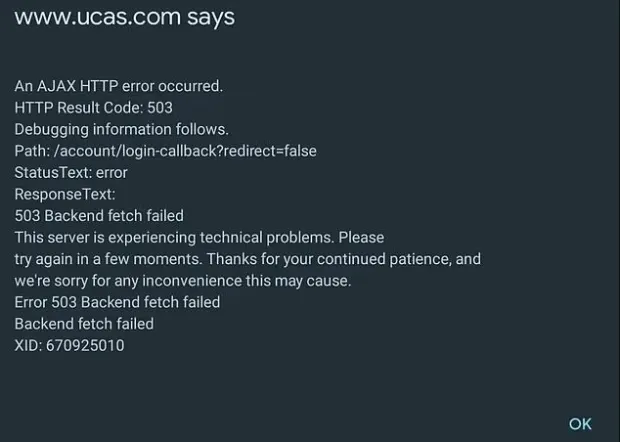UCAS Website Crashes As Millions Log on To find Out A Level Results

One wrote: “Ucas website crashed A very big loss for the students you’d think they’d be prepared.”
Another said: “Hey UCAS online your site/app has crashed, as if these kids haven’t been through enough!
“Of all the days not to fail, it’s today.”
UCAS told The Sun: “Students received a personalised email confirming their decision just after 8am today.
Also Read: –American Express Website Crashes as Taylor Swift fans Buy Pre-sale Tickets
UCAS: The Gateway to Higher Education in the UK
Introduction: The Universities and Colleges Admissions Service (UCAS) is the centralized service that students use to apply for undergraduate courses at universities and colleges in the UK. Established in 1992, UCAS oversees the application process for students to higher education institutions, ensuring that the process is standardized, fair, and transparent.
How UCAS Works:
- Registration: Students begin by registering on the UCAS website, creating a personal profile with their details.
- Course and University Selection: Students can choose up to five courses (with some exceptions) at different universities or colleges.
- Personal Statement: One of the key components of the UCAS application is the personal statement, where students detail their interests, experiences, and reasons for choosing a particular course.
- References: Applications also require a reference, usually from a teacher or advisor familiar with the student’s academic achievements.
- Submission: Once the application is complete, it’s submitted electronically via the UCAS website.
- Offers: Universities and colleges review applications and make offers. These can be conditional (based on achieving certain grades) or unconditional.
- Decisions: Students decide on their preferred choice (firm choice) and a backup (insurance choice) and await results.
- Clearing: If students don’t meet the requirements of any offers, they can apply for other courses through the Clearing system.
Courses: UCAS covers a vast array of undergraduate courses, spanning:
- Arts and humanities
- Sciences (biological, physical, social)
- Engineering and technology
- Medical and health sciences
- Business and economics
- Education
- Law
- And many more
Colleges and Universities: UCAS is affiliated with over 380 universities and colleges in the UK. This includes world-renowned institutions like the University of Oxford, University of Cambridge, Imperial College London, and University of Edinburgh, among others. It also encompasses a wide variety of specialized institutions, such as arts schools, agricultural colleges, and conservatoires.
Other UCAS Services: Beyond undergraduate admissions, UCAS also manages:
- UCAS Postgraduate: For those looking to pursue master’s or doctoral studies.
- UCAS Conservatoires: For courses in music, dance, drama, and musical theatre at a conservatoire.
- UCAS Teacher Training: For postgraduate teacher training programs.
- UCAS Progress: For post-16 education and training.
Conclusion: UCAS plays a pivotal role in the UK’s higher education landscape, guiding students through one of the most crucial decisions of their academic lives. With its comprehensive database of courses and institutions, coupled with a streamlined application process, UCAS ensures that students have the resources and support they need to make informed choices about their future. Whether you’re a domestic student or an international applicant, UCAS is the essential bridge to higher education in the UK.
UCAS Website Crashes
Top A-level scores have dropped by over 10%, with the overall pass rate at its lowest in 15 years.
As hundreds of thousands of students throughout the UK received their marks on Thursday, the Ucas website crashed, causing turmoil for those wanting to secure a university place.
It comes as the 19,000 students who were not admitted race for clearing spots after the latest numbers indicated that the number of students accepted onto UK degree courses declined 2.6% from the previous year.
Ministers and the English exams authority sought to return grades to 2019 levels this year, with the Education Secretary arguing that the latest UCAS numbers demonstrated how the UK Government was “right to return the grading system to normal.”
According to national data, the proportion of A-level candidates receiving top grades is down 9.2 percentage points from previous year. This year, just over a quarter (27.2%) of UK entrants received an A or A* grade, compared to 36.4% in 2022.
This was, however, greater than in 2019, the previous year that summer exams were held before the epidemic, when 25.4% of entrants received A or A* grades.
However, the proportion of entries graded A* to E has decreased to 97.3% this year, which is lower than both 2022 (98.4%) and the pre-pandemic year of 2019 (97.6%), and is the lowest overall pass rate since 2008 (97.2%).
The Joint Council for Qualifications (JCQ) numbers encompass A-level entries from students in England, Wales, and Northern Ireland.
The Association of School and College Leaders (ASCL) general secretary, Geoff Barton, observed a “sharp fall” in the top A-level grades. “The proportion of students achieving the top A-level grades has dropped sharply this year, not because of underperformance, but because the grading system has been adjusted in the aftermath of the pandemic so that the distribution of grades in England is similar to 2019,” he stated.
“However the rationale, it will feel like a bruising experience for many students, as well as schools and colleges that will have seen a sharp drop in top grades compared to the previous three years,” he added.
Amid warnings from exams regulator Ofqual that this year’s A-level results in England will be lower than last year, it has also been indicated that school leavers may face higher competition for university places this year due to an increase in the population of 18-year-olds and foreign demand.
Fears of disappointment have been heightened by the possibility that this cohort of children will have higher expectations, having not taken GCSE exams and instead been handed teacher-assessed grades during the pandemic, resulting to record-high GCSE results in 2021.
Pupils began receiving their A-Level results and signing on to the UCAS website to check the status of their university applications around 8 a.m. on Thursday, when the organization issued its first data.








